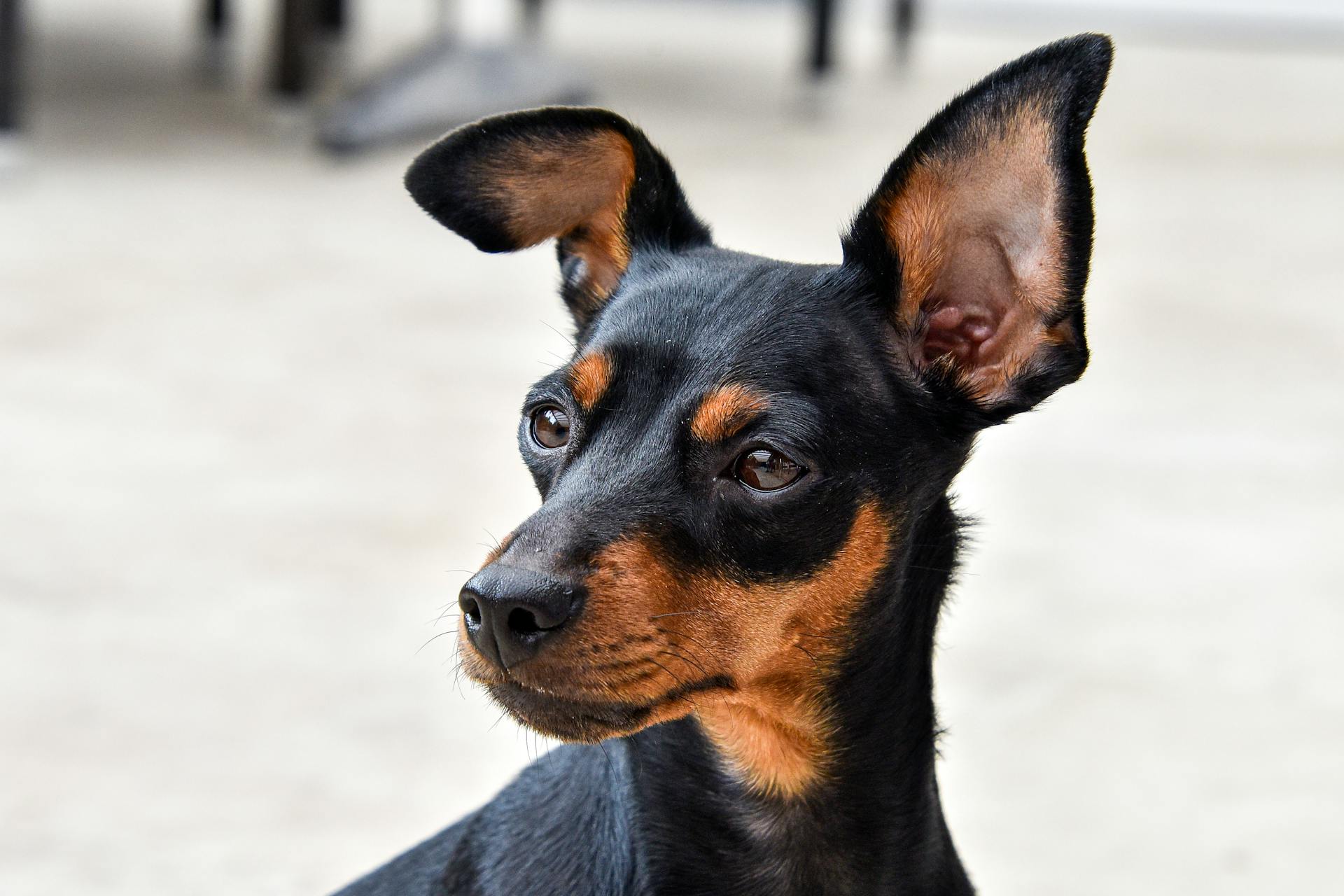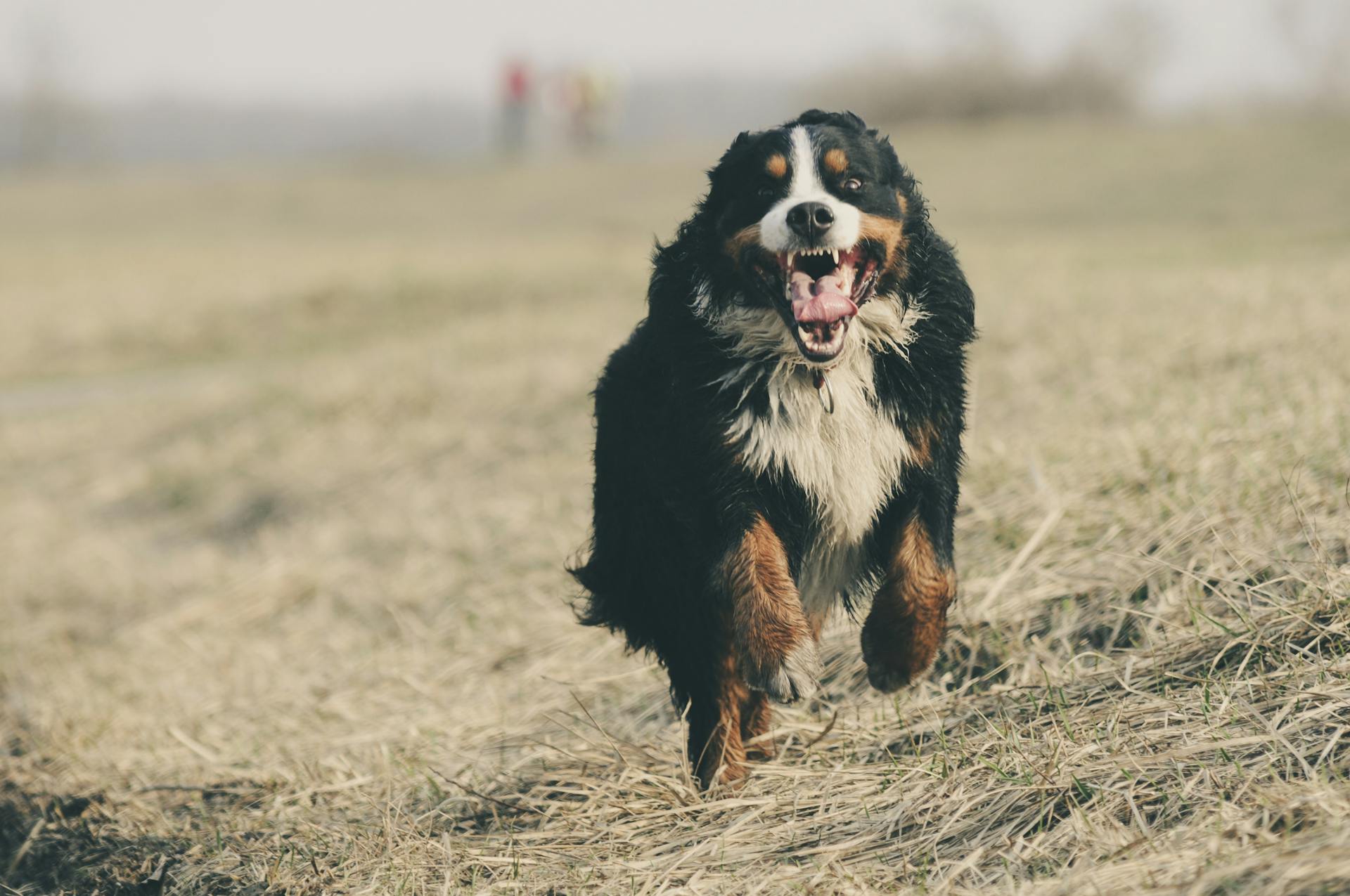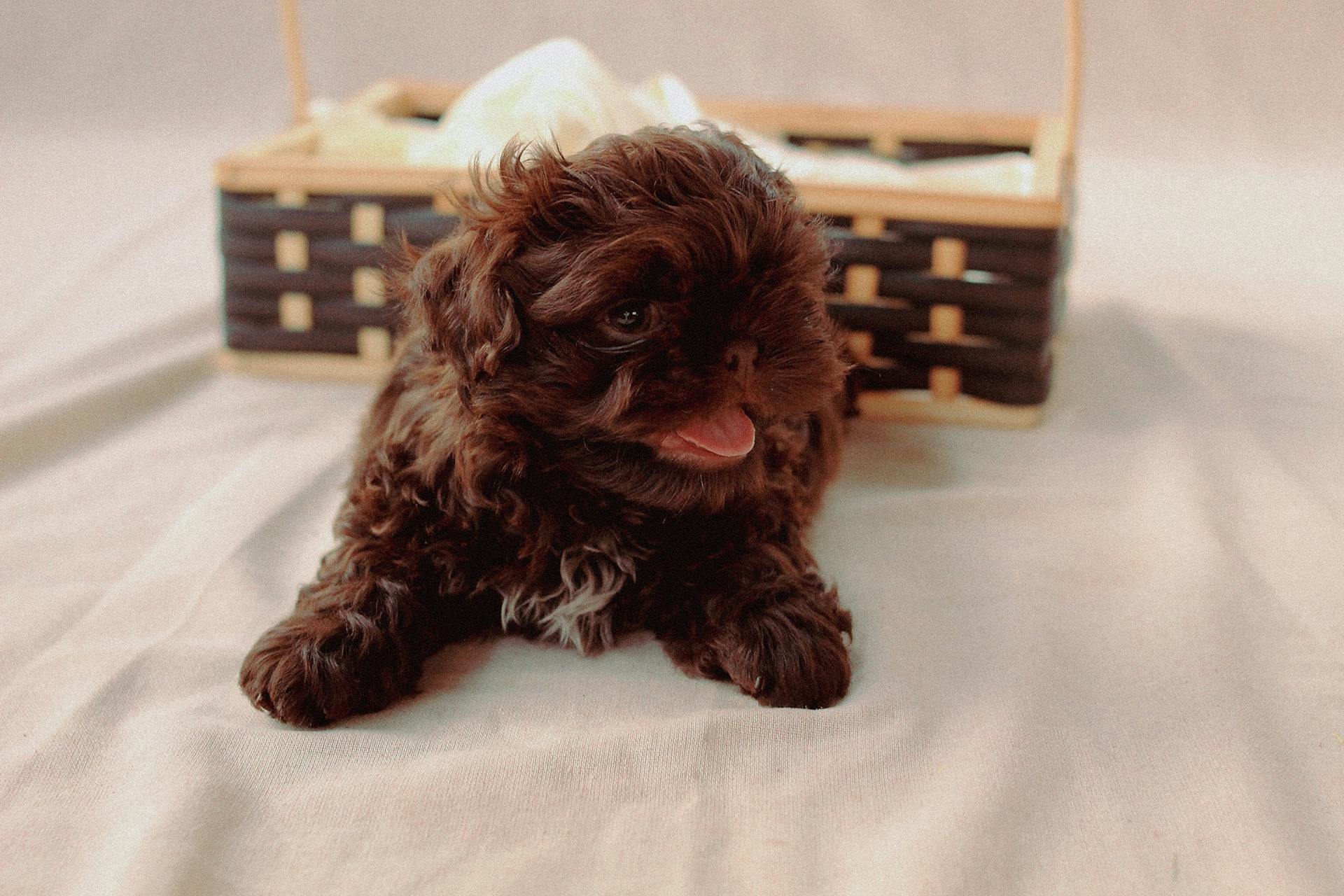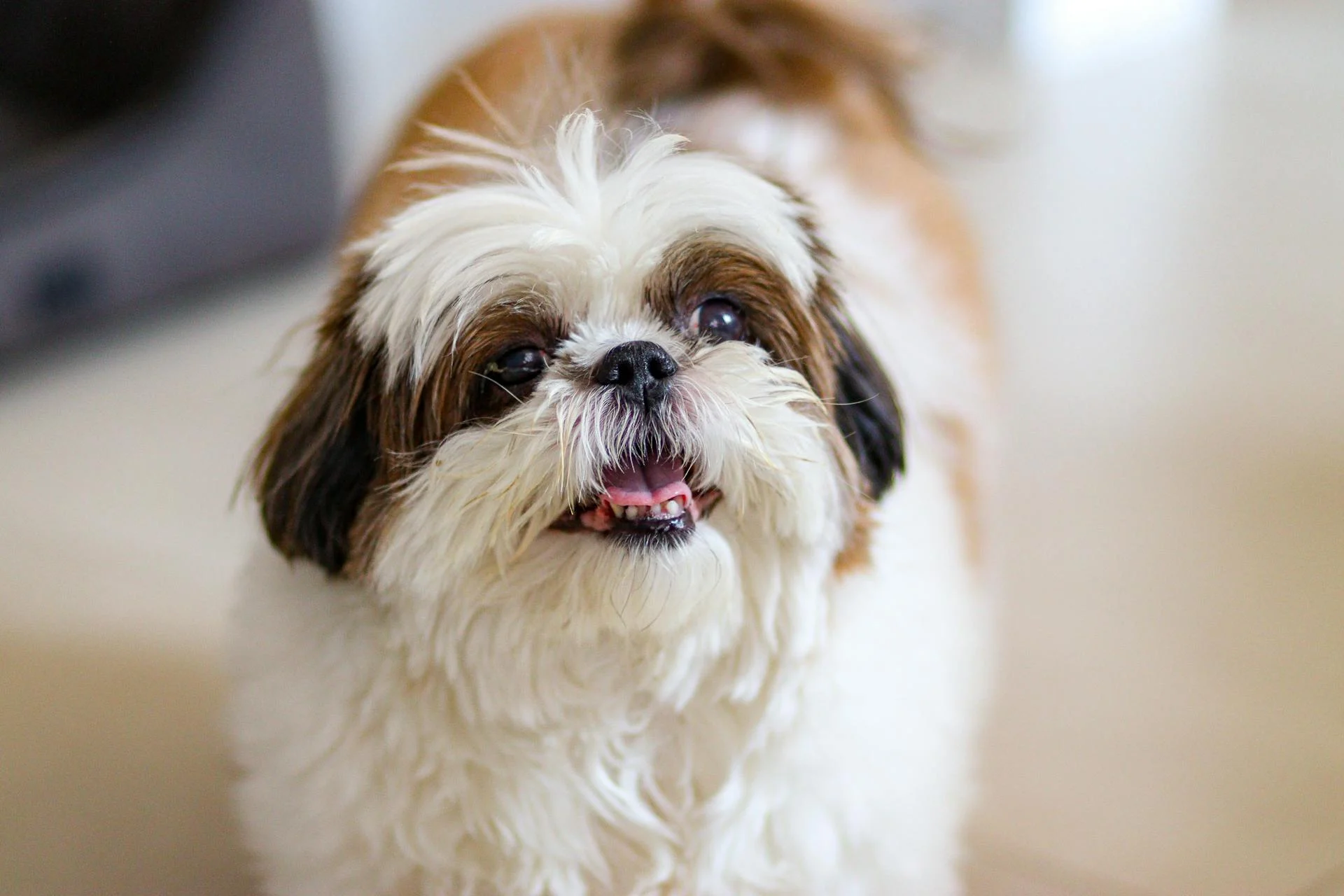
Shih Tzus are adaptable dogs that thrive in small living spaces, such as apartments, due to their calm and quiet nature.
They require regular grooming to prevent matting and tangling of their long, flowing coats.
A balanced diet is essential for maintaining the Shih Tzu's overall health, with a daily intake of 1/4 to 1/2 cup of high-quality dog food.
Shih Tzus are known for their friendly and outgoing personalities, making them great companions for families and individuals alike.
Their short snout and brachycephalic skull structure can make breathing more difficult, especially in hot or humid weather.
With proper care and attention, Shih Tzus can live up to 10 to 16 years, providing a long and loving relationship with their owners.
Shih Tzu Basics
Shih Tzus are nicknamed "the little lion dog" due to their large, dark eyes and thick, fluffy coat.
They typically weigh between 4-7 kg and stand 25-28 cm tall at the shoulder, making them a small and sturdy breed.
Shih Tzus have a muscular build and a compact body, giving them a charming and robust appearance.
Their soft and silky coat requires regular brushing and grooming to stay healthy, tangle-free, and shiny.
The Shih Tzu's luxurious coat comes in a wide range of colors, including white, black, red, brown, and silver, which adds to their visual appeal.
One of the most striking features of the Shih Tzu is their "lion head" look, which includes a short snout, broad forehead, and large round eyes.
General Breed Characteristics
The Shih Tzu is a small and sturdy dog breed, typically weighing between 4-7 kg and standing 25-28 cm tall at the shoulder. They have a muscular build and a compact body, giving them a charming and robust appearance.
Their soft and silky coat is one of their most distinctive features, and it requires regular brushing and grooming to keep it healthy, tangle-free, and shiny. This grooming routine not only helps maintain their coat's beauty but also promotes a strong bond between the dog and its owner.
Recommended read: Shih Tzu Dog Grooming
Shih Tzus have a unique "lion head" look, with a short snout, broad forehead, and large round eyes. Their small, pointed ears complete their adorable appearance.
Here are some of the key characteristics that set Shih Tzus apart:
- Soft and silky coat
- Short snout
- Broad forehead
- Large round eyes
- Small, pointed ears
Their luxurious coat comes in a wide range of colors, including white, black, red, brown, and silver, adding to their visual appeal.
Background
The Shih Tzu is a small, friendly dog breed that originated in Tibet. They were bred as companions for royal families.
Their name "Shih Tzu" literally means "lion dog", but they're actually quite small, typically weighing between 9 and 16 pounds.
Shih Tzus have a long, flowing coat that requires regular grooming to prevent matting and tangling. This can be a bit of a challenge for some owners.
They're known for their outgoing and affectionate personalities, making them great family pets.
Personality and Behavior
The Shih Tzu's personality and behavior are truly one of a kind. This breed is known for its friendly and affectionate nature, making it an ideal companion for families of all ages.
Shih Tzus are highly intelligent and trainable, but they can be a bit stubborn and dominant at times. Consistent and firm training from an early age can help establish boundaries and prevent behavioral issues.
They thrive when they are included as part of the family and enjoy being involved in daily activities. Shih Tzus have a natural affinity for people and are known for their loyalty and devotion.
Positive reinforcement techniques, such as rewards and praise, work well with this breed, as they respond well to encouragement and positive interactions. Early socialization is also crucial to ensure that Shih Tzus develop good manners and get along well with other dogs and people.
Shih Tzus require mental and physical stimulation to keep them happy and healthy. Regular walks, playtime, and interactive toys are essential to prevent boredom and promote their overall well-being.
Their adaptable nature makes them suitable for various lifestyles and living conditions. Whether you live in a small apartment or a spacious house, they can easily adapt to their surroundings.
Here are some key qualities that make Shih Tzus such wonderful companions:
- Playful
- Clever
- Outgoing
- Spunky
- Lively
- Happy
- Alert
- Slightly independent
- Loyal
- Gentle
- Active
Overall, with consistent training, early socialization, and regular mental and physical stimulation, Shih Tzus can thrive and bring immense joy to their owners.
Shih Tzu Care
Shih Tzus are known for their beautiful, long coats, but they require regular grooming to stay healthy and shiny. Brushing their coat weekly can help reduce shedding and maintain its shine.
To keep your Shih Tzu's coat beautiful, brush it as a bonding ritual, turning brushing into a loving experience. This will help connect with your Shih Tzu while keeping their coat healthy.
Bath time should be gentle and playful. Keep baths calm to promote a healthy coat and a happy pup. A calm bath time is key to a healthy coat and a happy pup.
Regular nail trims are essential for your Shih Tzu's comfort. Think of nail trims as a pawdicure, which is not just about looks but also about keeping your furry friend comfortable while they explore the world.
A nutritious diet is essential for a healthy coat. A healthy diet equals a glossy, vibrant coat, so make sure to feed your Shih Tzu a balanced diet.
A unique perspective: Brushing a Shih Tzu
Here's a list of regular grooming tasks to keep your Shih Tzu in top shape:
- Brush their coat weekly
- Trim their nails regularly
- Bathe them every 3-4 weeks
- Clean their ears regularly
- Check their coat regularly for tangles or mats
By following these grooming tips, you can give your Shih Tzu a long and healthy life. Regular grooming is essential for their overall health and well-being.
Training and Nutrition
Training a Shih Tzu can be more difficult than training other types of dogs, but with the right approach, you can effectively train your pup in no time.
Shih Tzus are people-pleasers and love to be social and outgoing, making them quick learners when trained with rewards, attention, and praise.
Using treats while giving praise for following instructions can also help to keep your Shih Tzu engaged and motivated during training sessions.
Many recommend hiring professionals to train Shih Tzus, especially if you can start at a young age, to help integrate early socialization and support their social skills and mental health.
Your Shih Tzu's diet should also be curated according to their age, with puppy food first, then moving on to adult food and senior food as they get older.
Choosing a protein-rich diet with quality animal protein sources like chicken or fish as the main ingredients can support your Shih Tzu's muscle maintenance and overall health.
Expand your knowledge: What Does Shih Tzu Eat
Training
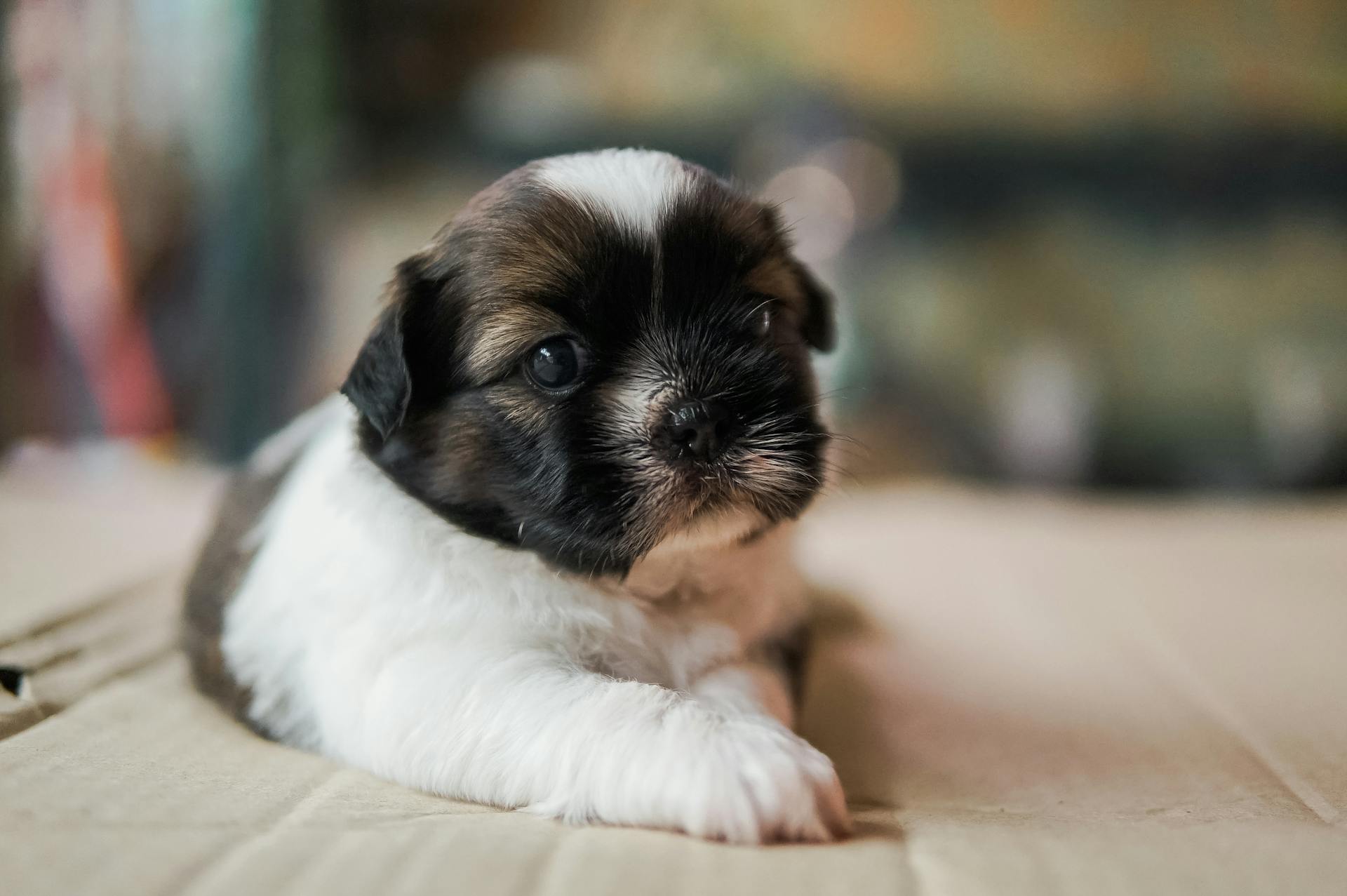
Training a Shih Tzu can be more difficult than training other types of dogs, but if you're prepared, you can effectively train your pup in no time.
Shih Tzus are little charmers who know how to bend the rules while appealing to your sympathetic side as a pet parent. If you can withstand your pup's charm and stay firm, you should have no problem training your furry friend.
Using rewards, attention, and praise are the best ways to train your Shih Tzu. Treats can also be included to give them praise for following your instructions.
Many recommend hiring professionals to train Shih Tzus, especially if you can start at a young age. Early socialization is also crucial for your pup's social skills and mental health.
Here are some key characteristics of Shih Tzus that are helpful to know when training:
- Shih Tzus are people-pleasers.
- They love to be social and outgoing.
- They are quick learners due to their intelligence.
If you're looking for ways to keep your Shih Tzu fit and active, training sessions are a great place to start. With patience, consistency, and positive reinforcement, you can help your Shih Tzu become a well-behaved and loving companion.
Shih Tzu Nutrition Tips
Shih Tzus require a protein-rich diet with quality animal protein sources like chicken or fish as the main ingredients to support their muscle maintenance.
Real meat should always be the first ingredient in your Shih Tzu's dog food, not "meat meals" which can contain by-products of an animal.
Avoid dog foods that list grains with gluten, such as corn or soy, and opt for alternative whole grains like quinoa, oats, and rice instead.
Your Shih Tzu's diet should be curated according to their age, starting with puppy food and then moving on to adult food and senior food as they get older.
Meat like lamb, chicken, turkey, salmon, and duck are excellent ingredients to look for on the dog food label.
Feeding your Shih Tzu a variety of whole fruits and vegetables is also essential for their overall health and wellness.
If your dog has dog food allergies, look for hypoallergenic dog food that can help alleviate their symptoms.
Shih Tzus are prone to health problems like obesity, so it's essential to monitor their food intake and ensure they're not overeating.
For another approach, see: Shih Tzu Health
Frequently Asked Questions
What is the rarest Shih Tzu color?
The rarest Shih Tzu color is blue, which is extremely rare and only produced by a few breeders. Determining blue Shih Tzus can be challenging due to varying shades of purple, grey, and gunmetal grey.
What is the common problem with Shih Tzu?
Common health issues in Shih Tzus include periodontal disease, anal sac impaction, and ear disorders. Regular veterinary check-ups can help prevent or detect these problems early on.
What two dogs make up a Shih Tzu?
A Shih Tzu is a cross between the Pekingese and the Lhasa Apso breeds. This unique heritage makes the Shih Tzu a beloved companion dog.
Sources
- https://optimeal.com/blogs/news/shih-tzu-temperament
- https://www.riverviewgrooming.com/post/shih-tzu-haircuts-low-maintenance-styles-for-busy-owners
- https://supertails.com/pages/shih-tzu
- https://www.petduka.com/en/knowledge-base/dog-breeds/shih-tzu/
- https://actavetscand.biomedcentral.com/articles/10.1186/s13028-020-00528-0
Featured Images: pexels.com
